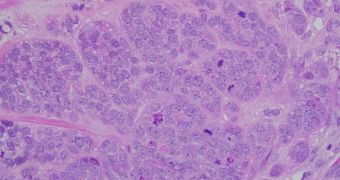Experts with the Stanford University School of Medicine have determined that cells shed by cancer tumors in the human body exhibit great genetic diversity. Some of these cells are able to influence gene expression, enabling them to take up residence in organs other than the one they originated in.
When tumors begin to shed cells, the situation becomes extremely serious for patients. Usually, this process marks the beginning of the advanced stages of the disease. Once cancer cells make their way into the bloodstream, they spread throughout the body.
When they take up residence in other parts of the body, metastasis occurs. This is the final stage of the condition, when tumors are spread to all organs, and death is inevitable. Scientists hope to learn more about how this process occurs, in order to stop it, or preventing it from happening at all.
Interestingly, not all cells shed by tumors have the ability to influence gene expression favorably. Some may be benign, unable to survive at other locations than their point of origin. Investigators want to use these data to create new therapies against the condition.
The main implication of the new study is that doctors may need to change their view on cancer. Rather than seeing it as a single disease that needs a single treatment, it should be viewed as a collection of individual conditions, and addressed accordingly.
This also means that cancer models currently being used for research need to be upgraded as well. Details of the new study were published in the May 7 online issue of the peer-reviewed, open-access journal PLoS ONE, which is edited by the Public Library of Science.
“Within a single blood draw from a single patient, we're seeing heterogeneous populations of circulating tumor cells,” says the chief of surgical oncology research at SUCM, Stefanie Jeffrey, MD, who is also a professor of surgery. She was the senior author of the new study paper.
The discovery also implies that analyzing a single biopsy taken from a cancer patient may not be enough to figure out what is going on inside the body. The limited data provided by such an analysis may not reveal the full extent of molecular changes taking place, EurekAlert reports.
Understanding these changes is extremely important for figuring out what mechanisms support the development of tumors, and promote their spread through the body. In the future, researchers plan to investigate how each type of cell shed by tumors reacts to specific therapies.

 14 DAY TRIAL //
14 DAY TRIAL //